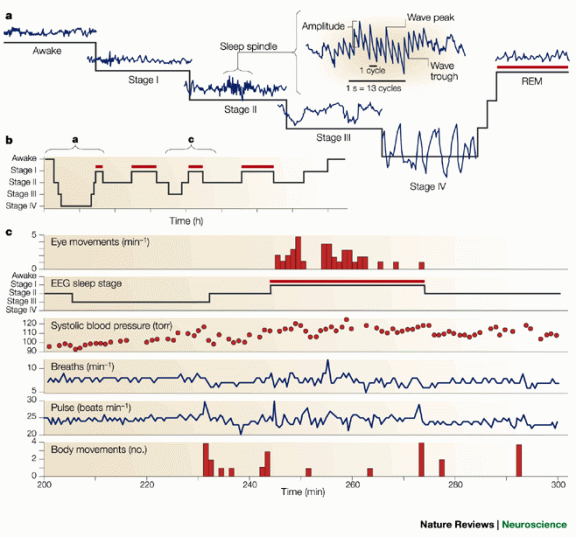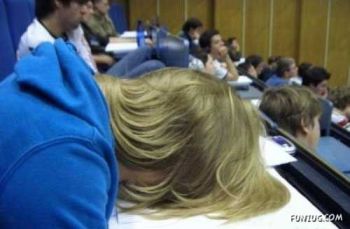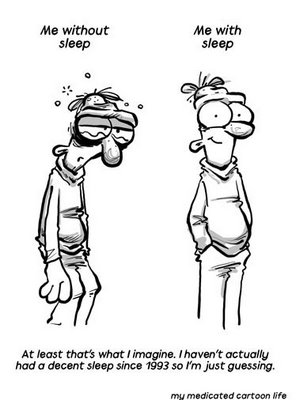Humans and animals alike are bound to their need for sleep. However, there remains many mysteries such as; ‘What is sleep?’ ‘How is sleep controlled?’ Why is it necessary?’ ‘What happens if you get too much or too little?’. These interesting complicated questions have yet to be solved. There are many people who could be described as ‘slow at doing things’ or ‘sleep too much’ or even ‘lazy’, but could these characteristics be accounted for by genetic sleeping disorders or other health problems or could it just simply be their attitude and lazy mind-set?
What is sleep and what is the underlying mechanism of control?
Sleep is a highly conserved process that can be observed in a wide range of organisms from cyanobacteria to humans (1). In humans, it is a state characterised by altered consciousness, high level of brain activity and involves inhibition of sensory activity and voluntary muscles. Sleep consists of four main stages; the first three stages, termed N1, N2 and N3, are made up of non-rapid eye movement sleep (NREM) compared to the last stage which is made up of rapid eye movement sleep (see Figure 1). Humans cycle through the stages around every 100mins throughout the night.

Figure 1. Analysis of human body features during sleep. It is evident that there is distinct brain activity during the different stages of sleep.
Alexander Borbély, in 1982, postulated that sleep is regulated by two processes:
- Circadian pacemaker (a biological clock ingrained within all cells)
- Homeostatic process (the inevitable need to return back to the state of sleep)
It turns out his observations were very good and progress in the understanding of sleep has progressed rapidly since then, but like most findings so many new questions arise in complex systems . It is well recognised that the timing of sleep is due to the circadian clock which is a complex feedback pathway that involves the CNS and surrounding tissue allowing the body to communicate when to sleep. The master clock which controls all the other clocks in the body is found in the suprachiasmatic nucleus in the hypothalamus region of the brain, which contains photoreceptors – these detect light and generate a signal which in effect tunes the body to stay most awake during the periods when light is present. Both glutamate (Glu) and pituitary adenylyl cyclase-activating peptide (PACAP) are released upon light stimulation (2), so these could be the signalling molecules that are helping the body determine the sleep cycle. Adenosine and melatonin (in diurnal animals) are thought to play important roles in sleep/awake determination. Adenosine is created throughout the day and increasing levels of this molecule eventually inhibit many of the processes required for wakefulness. Melatonin on the other hand is only released from the pineal gland during sleep and is associated with keeping you feeling sleepy. Genetic factors have also been found to have influence on sleep, one such example is the ABCC9 gene which influences the duration of sleep in humans (3).
Why is sleep necessary and how much is required?

Sleeping in lectures after spending all night trying to finish work is typical for an undergraduate.
Sleep seems to be an extremely important process due to the absence of non-sleep requiring animals, however it’s purpose is unknown. There have been many ideas circulating regarding the function of sleep such as fighting infections, energy conservation, brain development and recovery. Sleep modifies the timing that many processes which are normally active during the day and switches them off/ reduces their activity, such example is the digestive system.
What happens if you get too much or too little sleep, and what is the recommended amount?
Sleep patterns and the required amount differs through life and between individuals. Children in order to develop and function properly generally need more sleep since they are going through major developmental milestones. Newborns require up to 18 hours of sleep and this requirement decreases as one ages, adults require up to 7 hours. It is understood by the layperson that too much sleep or too little has a major effect on health, we’ve all felt how horrible it is to go through the day sleepy. The major health concern with not enough sleep is the possibility of accidents happening; making a mistake in judgement can sometimes mean life or death, e.g. driving a car whilst feeling sleepy. The effects of not having enough sleep depends on what age / developmental stage you are at. In children not enough sleep could mean impaired cognitive function, memory lapses and fatigue – these would have an effect school performance and limit future success opportunities for the child. Lack of sleep can also double the risk of death from cardiovascular disease, increase the risk of type 2 diabetes and be responsible for obesity.
Lifestyle can greatly contribute to how much sleep you need, simply being lazy and sleeping more than you need or being willful and staying awake for longer than you should could disrupt your circadian rhythm – which in turn will lead to side effects. However, sometimes it’s not choice that impacts your health but rather a sleep disorder. Doctors have described more than 70 sleep disorders, most of which can be managed and treated if diagnosed correctly. The most common sleep disorders include insomnia, sleep apena, restless legs syndrome and narcolepsy (4).
In conclusion, it is evident that sleep is an important process that shouldn’t be skipped or ignored. Despite medical advances in the field, sleep still remains to be elusive.
References/Further reading
(1) Circadian system in Cyanobacteria resemble rhythms found in human sleep. Available at: <http://phys.org/news188138468.html>
(2) Pituitary adenylyl cyclase-activating peptide: a pivotal modulator of glutamatergic regulation of the suprachiasmatic circadian clock. Avaliable at: <http://www.ncbi.nlm.nih.gov/pubmed/10557344>
(3) The ABCC9 of Sleep: A Genetic Factor Regulates How Long We Sleep. Available at: <http://www.sciencedaily.com/releases/2011/11/111124150237.htm>
(4) Brain Basics: Understanding Sleep. Available at: <http://www.ninds.nih.gov/disorders/brain_basics/understanding_sleep.htm>




I didn’t know restless leg syndrome counted as a sleeping disorder … Is it also true that if you didn’t get enough sleep during the week but made up for it during the weekend i.e. have a lie in it’s just as good as having a normal sleeping pattern? I like how you talked about a different topic for once xD
That’s an interesting question. From what I understand (you should probably confirm this further) sleep like all cycles is essential, you eventually succumb to falling asleep but there is a lot of leeway to how much you need in order to function like normal. If you do not sleep well all week like you say, yes you can get your cycle ‘back to normal’ over the weekend but the concept of sleep ‘dept’ is vague. I am not convinced that you can make up for not sleeping as much one day and make up for it the next. I think of it as one day you do not give your body enough time to recovery and so you don’t feel as revitalised as you normally would. However if you give the body the required time (not too much nor too little) for recovery it would revitalise you back to the best state you can feel. Remember sleeping too much has a negative impact on health so if sleep ‘dept’ works unfortunately you cannot pay back all the sleepless nights by sleeping through the weekend.